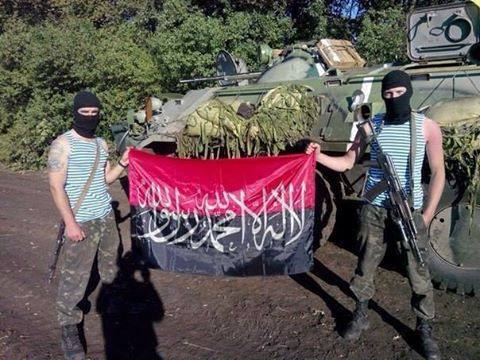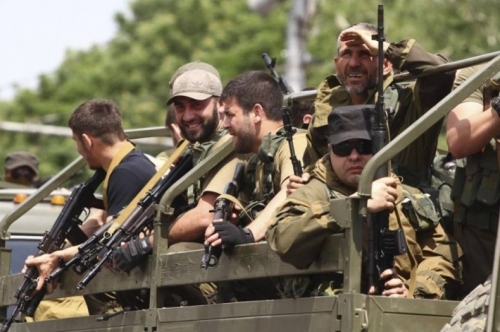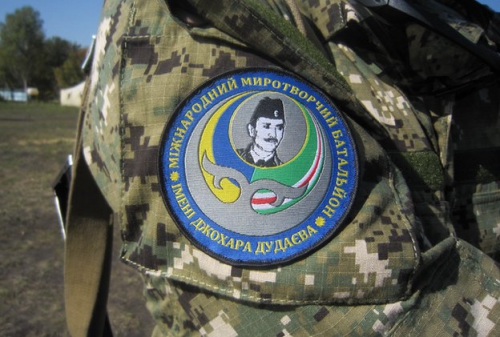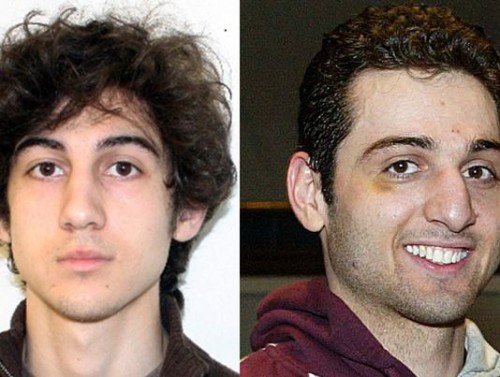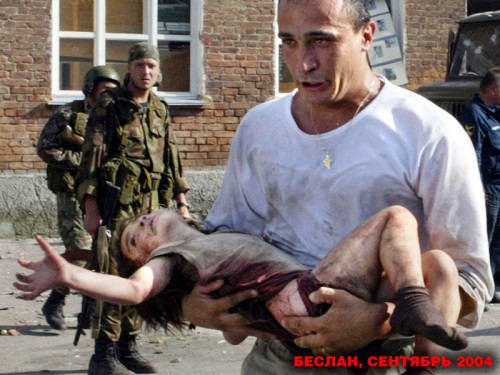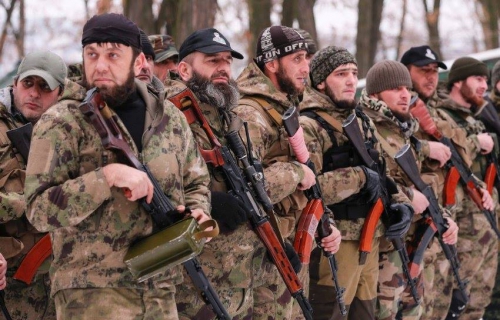
L'Empire du Chaos s'installe en Europe: l' État islamique en Ukraine
Auteur : Justin Raimondo
Traduction Claude Saker Francophone
Ex: http://zejournal.mobi
Kiev et les djihadistes: une sombre alliance
Alors que nous combattons l’État islamique, l’EI, alias ISIS, en Irak et en Syrie, et que les responsables américains soulignent le prétendu danger d’une attaque sur le territoire américain, Washington et le Califat se battent du même côté en Ukraine. Dans une remarquable série d’articles dans l’Intercept, Marcin Mamon s’est penché sur un aspect du conflit en Ukraine auquel personne d’autre n’a fait attention: le rôle joué par le Bataillon Doudaïev, «une force de combat des islamistes radicaux composée de Tchétchènes, mais incluant également des combattants de tout le Caucase ainsi que quelques Ukrainiens».
Les clés des organisations clandestines islamistes en Ukraine ont été remises à Mamon par un contact à Istanbul,Khalid, qui commande la branche ISIS locale. «Nos frères sont là», a-t-il dit à Mamon, et le journaliste s’est rendu en Ukraine où il a été mis en rapport avec un contact nommé Ruslan, qui l’a conduit au camp clandestin de Munayev.
Portant le nom du premier président de la Tchétchénie séparatiste, Djokhar Doudaïev, le bataillon Doudaïev était commandé par Isa Munayev, récemment tué dans l’est de l’Ukraine. Imprégnés d’une haine fanatique des Russes, qui soutiennent les rebelles de l’Est, les hommes de Munayev estiment également qu’ils paient une dette, puisque les bataillons du Secteur Droit ultra-nationaliste qui aujourd’hui luttent pour Kiev ont apparemment aidé les Tchétchènes dans le passé. Le Secteur Droit est un groupe paramilitaire ouvertement néo-fasciste qui a fourni une grande partie des forces qui ont rendu possible le coup d’État contre Viktor Ianoukovitch, l’ancien président ukrainien. Organisés en différents bataillons, dont la célèbre Brigade Azov, ils idolâtrent les collaborateurs nazis de la Seconde Guerre mondiale, qui ont combattu les troupes soviétiques: les ultra-nationalistes ont été accusés d’avoir commis desatrocités dans le Donbass, ainsi que de terroriser leurs adversaires politiques sur le front intérieur. D’après Mamon, ils ont également été impliqués dans la lutte contre les Russes dans la lointaine Tchétchénie, où l’ancien gros bonnet du Secteur Droit Oleksandr Muzychko a combattu aux côtés de Munayev et des frères contre les Russes.
Comme Ruslan l’a dit à Mamon:
« Je suis ici aujourd’hui parce que mon frère, Isa, nous a appelés et a dit: ‹Il est temps de rembourser votre dette. Il fut un temps où les frères de l’Ukraine sont venus [en Tchétchénie] et se sont battus contre l’ennemi commun, l’agresseur, l’occupant.›. »
A côté de cette solennelle éthique du guerrier, une autre raison probable du soutien de l’EI à Kiev est l’accès à des cibles occidentales, données ainsi aux terroristes. Comme Mamon l’indique:
«L’Ukraine est en train de devenir une étape importante pour les frères comme Ruslan. En Ukraine, vous pouvez acheter un passeport et une nouvelle identité. Pour 15 000 dollars, un combattant reçoit un nouveau nom et un document juridique attestant de sa citoyenneté ukrainienne. L’Ukraine ne fait pas partie de l’Union européenne, mais c’est une voie facile pour l’immigration vers l’Ouest. Les Ukrainiens ont peu de difficultés à obtenir des visas pour la Pologne voisine, où ils peuvent travailler sur les chantiers et dans les restaurants, comblant le vide laissé par les millions de Polonais qui sont partis à la recherche de travail au Royaume-Uni et en Allemagne. »
On nous dit que l’EI prévoit des attaques terroristes en Europe, et que les forces de sécurité sont occupées à recenser tous les suspects du continent; pourtant voici ce trou béant dans les défenses de l’Ouest, par où les frères s’infiltrent tranquillement, sans que les médias occidentaux en rendent compte. En coopération avec des groupes ultra-nationalistes comme le Secteur Droit, qui ont également créé leurs bataillons semi-autonomes, les islamistes d’Ukraine, brandissant des passeports ukrainiens, ont ouvert une passerelle vers l’Ouest.
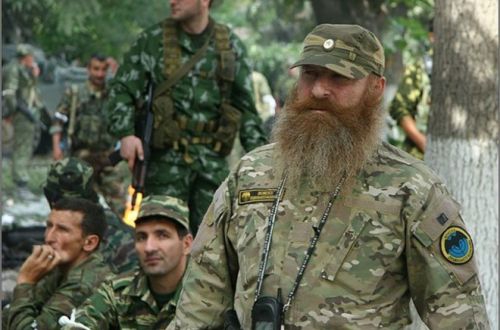
Les demandes faites à Washington de commencer à fournir des armes létales au régime ukrainien font maintenant partie du débat de politique étrangère à Washington, avec les habituels suspects exhortant l’administration à ouvrir le robinet d’armement. Pourtant, les Ukrainiens disent qu’ils obtiennent déjà une aide létale de pays qu’ils refusent d’identifier, selon le membre officiel du Conseil de sécurité nationale ukrainienne Oleg Gladovsky:
«[L’aide provient] d’endroits où nous n’avons aucune influence et où il n’y a pas de tollé public à ce sujet (que nous avons nous-mêmes contribué à créer dans certains endroits, malheureusement). C’est de ces pays que nous sommes en train de recevoir de l’aide létale.»
Alors d’où vient cette aide?
«Dans l’est de l’Ukraine, écrit Mamon, le drapeau vert du djihad flotte sur certaines bases des bataillons privés.» Mais comment ces groupes de combat sont-ils privés?
L’armée ukrainienne en loques, composée de conscrits peu motivés et mal armés, ne fait pas le poids contre les séparatistes, qui se battent sur leur propre territoire contre un envahisseur. Le régime de Kiev dépend de ces arméesprivées pour fournir une colonne vertébrale à sa force de combat, et il semble y avoir une relation symbiotique difficile entre l’armée ukrainienne régulière et ces volontaires, avec une approche non interventionniste adoptée par Kiev pour ces derniers . Si le régime ukrainien reconnait ouvertement aujourd’hui obtenir de l’aide de pays non nommés, il est normal de se poser la question: le Bataillon Doudaïev obtient-il une aide directe à partir des mêmes sources que celles qui équipent en armes les rebelles islamistes radicaux de Syrie – le Qatar, le Koweït, les Émirats arabes unis et les Saoudiens?
Comme les rebelles modérés syriens financés et soutenus par les Etats-Unis rejoignent l’EI en masse, le réseau djihadiste international étend ses tentacules en Ukraine pour reprendre le combat au nom de leurs frères.
L’un des principaux liens entre les factions ultra-nationalistes ukrainiennes et les islamistes était Oleksandr Muzychko, qui a combattu aux côtés du chef terroriste tchétchène Chamil Bassaïev – le cerveau derrière le massacre de l’école de Beslan – dans les guerres de Tchétchénie. L’année dernière, Muzychko a été tué dans une fusillade avec les policiers ukrainiens. Mais avant de disparaître, il était le visage public très évident du mouvement ultra-nationaliste d’Ukraine.
Dans une vidéo devenue virale, Muzychko et un groupe de ses compagnons du commando Secteur Droit sont entrés dans le bureau du procureur de la ville de Rivne, dans le nord-ouest de l’Ukraine, et ont giflé le procureur coupable de ne pas faire son travail à la satisfaction de Muzychko. Il a également fait irruption dans une réunion du conseil de la ville de Rivne, brandissant un fusil, et déclarant que le Secteur Droit ne désarmerait jamais. Alors que les autorités ont sans aucun doute trouvé les singeries de Muzychko ennuyeuses, ce genre de chose est normal dans la nouvelle Ukraine. Et il est probable que c’est son implication clandestine avec l’EI, bien plus que ses pitreries publiques, qui a provoqué la colère des autorités: elles lui ont tendu une embuscade et l’ont abattu le 24 mars de l’année dernière. Son implication avec la cellule EI en Ukraine est-elle devenue de plus en plus évidente, même pour ceux en Occident qui s’étaient contentés de regarder de l’autre côté?
Que les autorités de Kiev travaillent avec un avant-poste de l’EI est implicite dans toute l’article de Mamon: quand ce dernier s’est rendu au campement de Munayev en compagnie de Ruslan, ils n’ont eu aucune difficulté aux points de contrôle de l’armée ukrainienne, où la possibilité de percevoir des pots de vin ne faisait aucun doute, et ils sont passés à travers. Tout au long de l’article de Mamon nous entendons Munayev se plaindre de la pauvreté: le Bataillon Doudaïev, nous dit-on, doit dépendre d’activités criminelles pour financer le djihad. Pourtant, un oligarque mineur, nommé Dima leur remet 20 000 dollars, et il est question de vendre au marché noir de l’ambre à des «acheteurs du golfe Persique, y compris de riches cheikhs» – peut-être les mêmes riches donateurs qui ont si généreusement financé l’EI.
Les liens entre le régime de Kiev et l’enclave de l’EI en Ukraine sont nombreux, et seulement à demi cachés. Lorsque Mamon est arrivé au camp de Munayev, il a été accueilli par une voiture blindée qui, nous dit-on, a été donnée par Ihor Kolomoisky, l’un des hommes les plus riches d’Ukraine, récemment nommé gouverneur de Dniepropetrovsk. Kolomoisky, malgré son héritage juif, n’a aucun scrupule à s’allier à des groupes ouvertement antisémites comme le Secteur Droit, dont il a financé les bataillons: comme les djihadistes affiliés à l’EI, auxquels il a offert une voiture blindée, il ne pense qu’à la lutte contre Vladimir Poutine, qu’il méprise.
Une autre indication de l’alliance EI-Kiev est l’évasion d’Adam Osmaev, commandant-adjoint du Bataillon Doudaïev, d’une prison ukrainienne où il purgeait une peine pour avoir fomenté l’assassinat de Poutine. Après le coup d’état à Kiev, Munayev et ses compagnons ont fait sortir Osmaev de prison: quand ils ont été confrontés à la police ukrainienne à un barrage, ils ont été mystérieusement autorisés à passer. Comme le rapporte Mamon:
«Après une impasse dramatique, les Ukrainiens ont permis aux Tchétchènes de filer. (Il n’y a pas moyen de confirmer le récit de Ruslan, mais à l’automne 2014, le tribunal d’Odessa a soudainement déclaré qu’Osmaev avait suffisamment purgé sa peine et il a été libéré.) Osmaev et Munayev sont revenus à Kiev, et le bataillon Doudaïev a été créé.»
«De temps en temps, écrit Mamon, Munayev rencontre des représentants du Service de sécurité ukrainien, connu sous le nom de SBU.»
Le Bataillon Doudaïev compte environ 500 combattants, mais il y a aussi d’autres brigades djihadistes en Ukraine, organisées dans le Bataillon Sheikh Mansour, qui s’est détaché du Bataillon Doudaïev et «est basé à proximité de Marioupol, dans le sud-est de l’Ukraine», ainsi que deux autres groupes composés des Tatars de Crimée, comptant chacun environ 500 djihadistes.
Comme l’aide des États-Unis coule à flot en Ukraine, dans quelle mesure va-t-elle retomber sur ces alliés de l’EI – et quelle sera son utilisation future? Si John McCain et Lindsey Graham arrivent à leurs fins, les armes américaines vont bientôt se trouver dans les mains de ces terroristes, dont il est sûr que le djihad contre les Russes se tournera vers l’Ouest et frappera les capitales de l’Europe.
C’est un retour de flamme avec une vengeance: nous créons nos propres ennemis, et leur donnons les armes pour nous faire du mal, alors même que nous affirmons notre besoin d’une surveillance universelle pour les combattre. Les savants fous formulant la politique étrangère américaine sont en train de créer une armée de monstres de Frankenstein – qui ne manqueront pas d’attaquer leurs créateurs bercés d’illusions.
- Source : Justin Raimondo-Traduction Claude Saker Francophone



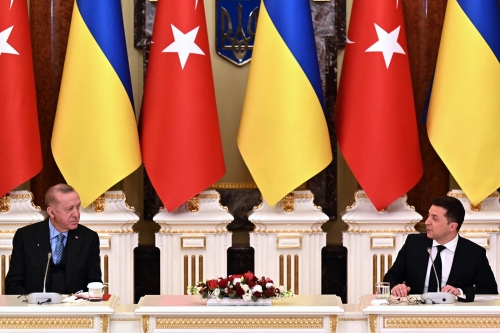
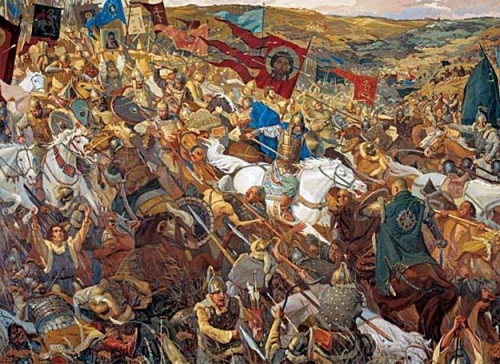
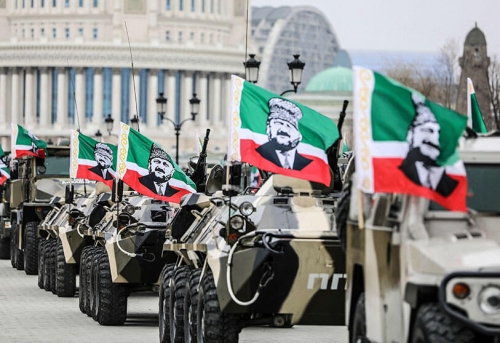

 del.icio.us
del.icio.us
 Digg
Digg